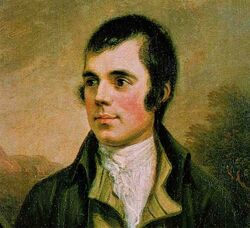
Image of Robert Burns, based on a 1787 portrait by Alexander Naysmith.
Robert Burns, often referred to affectionately as Robbie Burns or Rabbie Burns, (January 25, 1759 - July 21, 1796) was a Scottish poet and lyricist who is considered to be the national poet of Scotland. He is best known for his poetry in the Scots language[1], although he also wrote works, intended for non-Scottish readers to understand, in a light Scots dialect of English and standard English, some of his works existing in both Scots and English versions. Burns political and social views are often most clearly expressed in his English-language works. Burns' lyrics to "Auld Lang Syne" are sung, in a slightly modified form, at New Year celebrations around the world and his "Scots Wha Hae" long served as an unofficial Scottish national anthem. His other well known works include "A Red, Red Rose", "A Man's A Man for A' That", "To A Mouse", "Ae First Kiss", "The Battle of Sherramuir", "Address to a Haggis", "Tam O'Shanter" and "Halloween".
Burns is considered a precursor to the Romantic poets of the late 18th and early 19th centuries and influenced later liberal and socialist political movements. Burns works and Scottish culture in general are celebrated on the anniversary of his birth, Burns Night, in Scotland and by people of Scottish descent around the world.
In 2009, Burns was named in a poll conducted by the Scottish television channel STV as the greatest Scot in history.
Biography[]

Postage stamp bearing an image of Robert Burns, issued by the Soviet Union in 1956.
Robert Burns was born in Alloway in the south-west Scottish county of Ayrshire on January 25, 1759. He was the first of the seven children of tenant farmer William Burnes[2] and Agnes Broun. He attended Dalrymple Parish School for a short while but was largely educated by his father and other private tutors. He began working as a farm laborer at a young age. The strenuous physical work which he did permanently damaged his health. Burns first known poem "O, Once I Lov'd A Bonnie Lass" was written in 1775 when he was 15.
In 1786, Burns was offered a job as an accountant on a slave plantation in Jamaica.[3] Not being able to afford to pay for his passage to Jamaica, Burns was advised to raise money by having a volume of his poetry published. The first edition of his Poems Chiefly in the Scottish Dialect was published on July 31, 1786 and was an immediate success. Instead of emigrating to Jamaica, Burns moved to Edinburgh and settled comfortably into the city's literary society.

Statue of Robert Burns in Dumfries, Scotland.
Burns returned to his home county of Ayrshire in 1788 and took up farming again, although he also continued to write poetry. In 1791, he sold his farm, moved to the neighboring county of Dumfries and Galloway and settled in the town of Dumfries. He contributed to collections of Scottish folk songs and popular songs, often altering and expanding the lyrics of the songs and writing new lyrics to already existing tunes.
It has been suggested that Burns suffered from manic depression, alcoholism and a rheumatic heart condition. His ill health left him looking prematurely aged. Burns died on July 21, 1796 at the age of 37. He was originally buried under a simple gravestone in St. Michael's Churchyard, Dumfries but his body was moved to the Burns Mausoleum in the same cemetery in September 1815.
Burns married Jean Armour in 1788 but is also known to have had relationships with Elizabeth Patron, Mary Campbell, Agnes McLehose, Jenny Clow and Margaret Cameron. He fathered a total of twelve children.
Burns Night[]

A man recites Burns' "Address to a Haggis" at a formal Burns supper in Oxford, England in 2004.
The anniversary of Robert Burns' birth on January 25, Burns Night, is celebrated by many people in Scotland as an unofficial second national day.[4] The day is also widely celebrated in Northern Ireland, where many members of the Protestant community have Scottish ancestry. Burns Night celebrations are also held by other people of Scottish descent, as well as by lovers of Burns' poetry, around the world.
Burns Night, or an evening close to it, is most often celebrated by having a Burns supper, although such a supper in celebration of Burns' life and works can be held at any time of the year. A Burns supper may be either formal, at which there is a ceremony of ten steps which must be strictly adhered to, or informal. Both kinds of suppers typically feature readings of Burns' poetry and traditional Scottish dishes of haggis, turnips and potatoes, accompanied by Scotch whisky.
The first Burns suppers were held in the late 18th century by friends of the poet on the anniversary of his death, July 21. The first Burns Club, which included some members who had known Robert Burns personally, was founded in the Scottish town of Greenock in 1801 and began the tradition of holding the supper on the anniversary of the poet's birth instead.
Footnotes[]
- ↑ Scots is a language closely related, but not identical, to English. Native speakers of English may be able to read and understand Scots without much difficulty but are unlikely to understand every word.
- ↑ Robert Burns spelled his surname as "Burnes" until 1786.
- ↑ Burns made his own opposition to slavery clear in the 1792 poem "The Slave's Lament".
- ↑ The official national day of Scotland is St. Andrew's Day on November 30.
